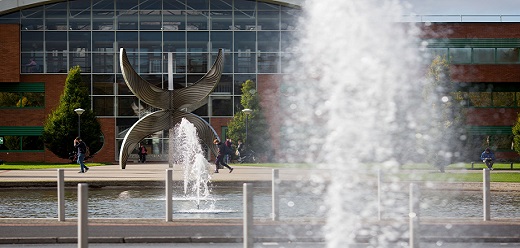
Brexit may not be “done”, as Boris Johnson would have it, for many years to come but the United Kingdom’s departure from the European Union is now an indisputable political fact. That Great Britain is leaving the ERASMUS programme is a clear indication that the consequences go far beyond the economic field and will impact deeply on the cultural and educational fields. The joint (and welcome) decision of the EU and the Government of Ireland to continue funding Northern Ireland based students’ access to this most successful EU programme is only a glimpse of the new era this island is entering, on which this blog post wishes to comment.
While the long-term consequences of Covid-19 are still unclear, we can be certain about two things. Firstly, that there will be very serious economic consequences for Ireland and secondly, that, once again, the European Union and the European Central Bank will provide the backing for the massive sums of money the Government will (temporarily) have to borrow. While Irish citizens may still feel aggrieved about the conditions of the Bank Bailout in 2010, they may feel less upset about the billion-euro credit line provided by the EU to lessen the long-term economic and social impact of the Covid-19 crisis.
Brexit will mean that Ireland will be linked ever closer to the EU and become more dependent on its success as a political project. The likelihood is that Ireland’s membership of the EU, and its broader economic, political, social and cultural interactions in Europe, will matter more and more in the future and that direct links with the Continent will increase. This will, undoubtedly, have a strong impact on the career prospects of the next generation. Irish citizens appear content with these developments: in the most recent EU public opinion survey Eurobarometer (no. 93) of summer 2020, Irish trust in the EU soared to 73%, a ten point increase since November 2019 and ten percentage points ahead of the next positively disposed member state, Denmark.
One might think, given the consequences of Brexit for the island, that these are good times for European Studies, and specifically for studying Ireland within the EU, in Irish education. After all, Irish knowledge of how the EU functions, and of Ireland’s increasingly vital trading partners within the bloc, is now more important than ever before. This is in fact acknowledged in another outcome of Brexit, the policy document Languages Connect: Ireland’s Strategy for Foreign Languages, 2017-2026 which demonstrates, after a decade-long prevarication on the issue of a languages strategy, a new urgency within the Dept. of Education and Skills no doubt strongly encouraged by business and industry concerns about language skill shortages in the new economic environment. As per the IHA’s Beyond Markets document, language is a major challenge posed by Brexit especially as Ireland needs to develop much stronger direct ties with non-English speaking member states. Fostering other EU languages beside the dominating French is of particular concern of Languages Connect with ambitious targets set for German, Spanish, Italian and Portuguese (beside Mandarin), aiming to have 20% of third level students studying a foreign language, increasing ERASMUS participation by 50%, double the number of teachers participating in teaching mobility programmes, as well as double the number of foreign language assistants in schools, the vast majority on the basis of cultural agreements with other EU member states.
However, plans, strategies and pronouncements are one thing, facts and funding are quite another. In terms of the European dimension in Irish education we have, arguably, been going backwards rather than forwards for quite some time. Here I would like concentrate on the third level sector.
The noticeable lack of European focus at second level is evident in the low priority the EU has within the curriculum (notwithstanding the recent introduction of the subject Politics and Society at Senior Cycle). This translates directly into CAO application figures. In 2019 (the Covid-inflated figures of 2020 are less indicative), CAO applications for third level courses with a particular relevance to Europe, i.e. those with a modern (European) language as a compulsory element, or with Europe in the title, declined in attractiveness, resulting in lower CAO points. For future Irish school-leavers well-schooled in the significance of the points for the image of individual courses, such decreases do little to improve the attractiveness of Europe-focussed courses. Low application figures in turn increase the internal pressure in universities on such programmes. In 2018, Maynooth University discontinued its European Studies course as a separate CAO entry and reduced it to a slimmed-down BA option. It remains to be seen whether this strategy works to increase student numbers but one consequence is without doubt: the disappearance of another BA European Studies from the CAO list further decreases visibility of Europe and the EU in the education system. Flicking through the first edition of the European Movement’s 2011 guide Studying Europe: An Audit of EU Related Qualifications in the Irish Third Level Sector one cannot but be amazed about the number of courses that have disappeared since then. Of the CAO-listed undergraduate degree programmes with the title European Studies only two have survived in the whole country, one in the University of Limerick and the other one in TCD. At postgraduate level the number of EU-related programmes has also declined, and within those the number of applicants.
All universities will point to their expanding ERASMUS programmes as indicators of their European credentials. One could also think of the establishment of the new UCD Jean Monnet Centre of Excellence in the New Political Economy of Europe launched in 2018 by President Higgins as well as Ireland’s spectacular successes in the highly prestigious Jean Monnet competition, an EU programme designed to foster European Studies at third level world-wide. In 2019, unnoticed by any education correspondent, Ireland won seven grants for chairs, modules, centres matching those of Germany or the UK (in the second-last year of participation). Moreover, one of the largest project grants Europe-wide went to the Brexit Institute in DCU. However, these successes can also be interpreted as proof that it is not the interest of Irish education in the EU that is expanding but rather the EU’s interest in Ireland is, including that of the European Commission itself which may impact on its educational and funding decisions, secondary of course to the traditionally high quality of the applications from a small number of Irish academics active in fields of study relating to the European Union.
A number of factors account for the decline of European Studies in Irish higher education institutions. One is the institutions’ chronic underfunding. This has driven universities to inscribe “internationalisation” rather than “Europeanisation” into their mission statements. Inspired by the HEA’s strategy paper “Internationalisation of Irish Higher education” institutional strategic plans rarely make explicit references to the EU and it is an open secret among academics that internationalisation is largely understood as forging links outside Europe with Asia and the US, where the double fees paid by students from these areas at all levels have become increasingly essential to plug Irish universities’ funding holes. Irish Educated, Globally Connected, an International Education Strategy for Ireland 2016-2020 does not mince its words: “This Strategy aims to support the development of global citizens through Ireland’s high quality international education system, by attracting talent from around the world to our education institutions […]”. Little has been done to specifically attract EU students to degree courses in Irish universities.
The Covid-19 pandemic has now put a serious question mark over the funding model forced onto Irish universities due to the dramatic drop-off in the number of non-EU students. The failure to support, and invest in, the European dimension on the teaching side over a decade may very well inflict damage in another way in the new phase we are entering: All universities are now ever more urgently asked to apply for EU research grants and the expected European orientation required for such applications will become even more important and explicit in the future, e.g. in the next multi-billion euro research and innovation framework for 2021-2025 aptly named Horizon Europe which sensibly requires to embed all applications in an overall European institutional strategy. We must therefore invest in the future of our research eco-system by foregrounding the European dimension at undergraduate level, as a continuation of a more multilateral, outward-looking and European-minded secondary education.
It will take more than strategy papers to make progress, it will take real funding, real commitment and a strong conviction that the purpose of Irish education is not simply the development of a sense of national identity and national interest but also the teaching of the principle of shared sovereignty and of European citizenship. The spirit of multilateralism and co-operation which provides the basis for the relative wellbeing of all EU citizens needs defenders among European young people who, as the climate activism shows, are only too eager to listen and learn about the broader picture. If such high-minded or intellectual arguments do not convince, future jobs will. As the safety valve of emigration to the US, Canada and Australia is shut off, the EU is wide open to the 1.5% of the EU’s population who are native speakers of the effective lingua franca of the EU – English – once they can demonstrate their openness to the exciting multilinguality and multiculturality that is the European Union, their readiness to actively engage with it, their willingness to learn from others and with others; the learning of at least one of our fellow EU citizens’ languages is a key component. This frame of mind can only be generated by the educational system whose ultimate purpose it to prepare students for the future. The Taoiseach’s recent announcement that foreign languages are to be brought back into primary schools where all public education starts is a step in the right direction, hopefully even a symbol for a brighter future for European Studies in these dark Covid-19 days.


